| Academic Guidance |
 |
Doing your PGCE at M level: Keira Sewell (2nd edition, 2012). Doing your PGCE at M level is a valuable guide designed to enable students to achieve success. Its approach, using clear explanations and case studies enable trainees to engage at a critical level and understand the potential benefits this can bring to them personally and professionally. |
 |
Readings for Learning to Teach in the Secondary School: Susan Capel (2010). Readings for Learning to Teach in the Secondary School brings together key articles to develop and support student teachers' understanding of the theory, research and evidence base that underpins effective practice. Designed for all students engaging with M Level study, each reading is contextualised and includes questions to encourage reflection and help you engage with material critically. Annotated further reading for every section supports your own research and writing. |
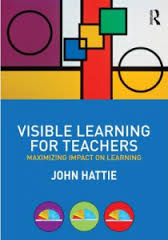 |
Visible Learning for Teachers: John Hattie (2011). Visible Learning means an enhanced role for teachers as they become evaluators of their own teaching. According to John Hattie Visible Learning and Teaching occurs when teachers see learning through the eyes of students and help them become their own teachers. |
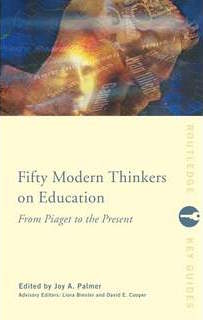 |
Fifty Modern Thinkers on Education: Liora Bresler (2001). This book looks at fifty of the twentieth century's most significant contributors to the debate on education. Among those included are: Pierre Bourdieu, Elliot Eisner, Hans J. Eysenck, Michel Focault, Henry Giroux, Jurgen Habermas, Susan Isaacs, A.S. Neill, Herbert Read, Simone Weill etc... |
 |
A guide
to teaching practice: Lawrence Cohen et alea (5th edition, 2010). This is the major standard text for all students on initial teacher training courses in the UK. Authoritative yet accessible, it covers the important basic skills and issues that students need to consider during their practice, such as planning, classroom organization, behaviour management and assessment. The book's focus on the quality of teaching and learning and consideration of the latest regulations and guidelines ensures that it fits comfortably within TTA and OfSTED frameworks. |
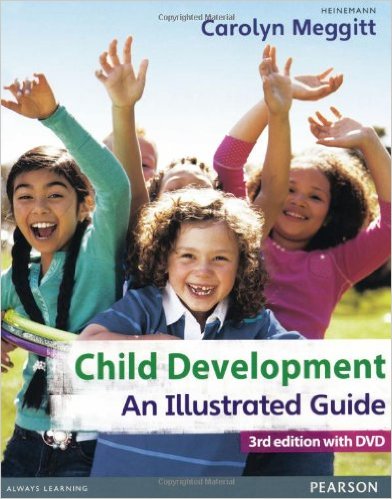 |
Child Development an illustrated guide: Carolyn Meggitt (2012). Fully updated and restructured so learners can match the new EYFS key areas and can be sure they have the most up-to-date information, Includes a DVD providing video clips of children’s developmental stages at all ages which gives learners the opportunity to experience this important area of child development and extended for children up to 19 years old. |
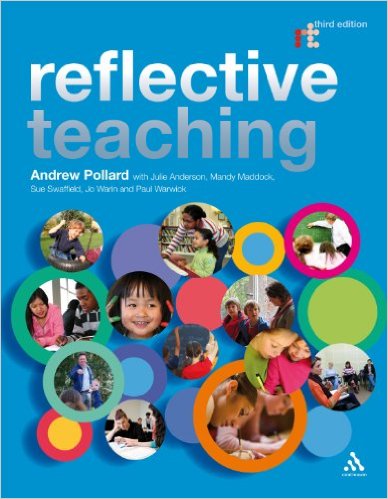 |
Reflective Teaching in Schools: Andrew Pollard (2014). Building on best-selling texts over three decades, this thoroughly revised new edition is essential reading for both primary and secondary school teachers in training and in practice, supporting both initial school-based training and extended career-long professionalism. Considering a wide range of professionally relevant topics, Reflective Teaching in Schools presents key issues and research insights, suggests 'Reflective Activities for classroom work and offers guidance on selected 'Key Readings with its companion volume: Readings for Reflective Teaching in Schools. |
 |
How to be a brilliant
trainee teacher: Trevor Wright (2007).
This cheerful and accessible book is packed with direct and straightforward advice drawn from the author’s extensive and successful personal experience as teacher-trainer, teacher and examiner. It sets out clear and practical guidelines to support your training and enhance your teaching, moving you directly towards a real understanding of how and why pupils learn and of how you can enhance your own progress. |
| Academic Papers |
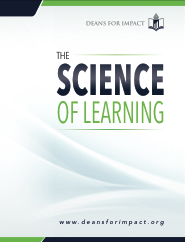 |
The science of learning: Deans for Impact (2015). This is a synopisis of learning from cognitive science over a range of key questions that is a resource for teachers and teacher educators. The questions are:
How do students understand new ideas?
How do students learn and retain new info?
How do students solve problems?
How do students transfer learning to new sits?
What motivates students to learn?
What are common misconceptions? |
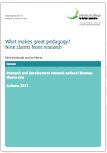 |
What makes great pedagogy? Nine Claims from research: Chris Husbands (2012). This paper looks for research evidence to support nine strong claims about the characteristics of nine highly successful pedagogies. The effective pedagogies give:
consideration to pupil voice;
depend on the behaviour, knowledge and beliefs of teachers;
involve clear thinking about longer term outcomes;
build on learning and experience;
involve scaffolding learning;
involve a range of techniques;
develop higher order thinking and metacognition;
embed assessment for learning;
are inclusive of all learners. |
| Teaching Practice Support (Generic) |
 |
Effective Teaching in Schools Theory and
Practice: Chris Kyriacou (3rd edition, 2009). Written by the author of the highly-successful Essential Teaching Skills this is the ideal introduction to what defines good teaching. Bridging the gap between theory and practice this handbook enables students to build on theoretical work where it matters in the classroom. |
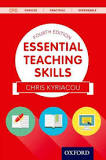 |
Essential Teaching Skills: Chris Kyriacou (4th Edition, 2014). This is the fourth edition of an excellent book which develops a range of ideas about teaching and learning and which explores some of the key skills. |
 |
The Teacher's Toolkit: Paul Ginnis (2001). Packed with practical classroom strategies this teacher's resource will enable you to: - meet the needs of different learning styles - stimulate your own creativity - add spice to your teaching - challenge the gifted - and the disruptive! Whatever subject you teach, this comprehensive volume will help you to develop thinking skills in your students; promote citizenship and an understanding of democracy; fine-tune study skills and help students acquire the attitude and skills for true independence. |
 |
How to teach: Phil Beadle (2010). How To Teach is the most exciting, most readable, and most useful teaching manual ever written. It is not the work of a dry theorist. Its author has spent half a lifetime working with inner city kids and has helped them to discover an entirely new view of themselves. This book lets you into the tricks of the trade that will help you to do the same, from the minutiae of how to manage difficult classes through to exactly what you should be looking for when you mark their work. How to Teach covers everything you need to know in order to be the best teacher you can possibly be. |
| Teaching Practice Support (Secondary) |
 |
Learning to Teach in Secondary School: Susan Capel (2016, 7th Ed.) Learning to Teach in the Secondary School is the market leading text for all undergraduate, postgraduate and school-based routes to qualified teacher status. It offers an in-depth and practical introduction to the knowledge, skills and understanding needed to become a confident and effective teacher. With a focus on evidence-based practice, the book includes a wealth of examples to demonstrate how to successfully apply theory to practice, and how to critically analyse your practice to maximise pupil learning. |
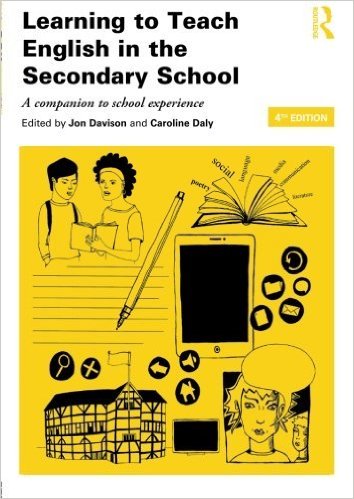 |
Learning to Teach <x> in the Secondary School: This is part of a series of books focussed on the secondary subjects. These are good combination of the theory and the practice of teaching and learning they come in:
|
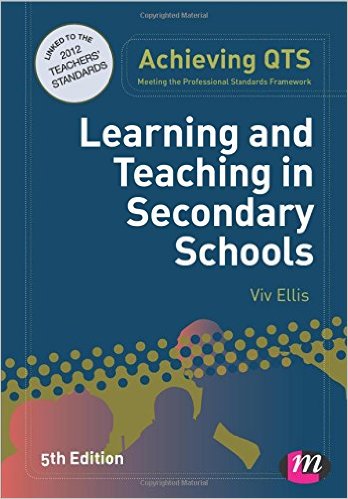 |
Learning and Teaching in Secondary
Schools: Viv Ellis (2007). This popular text for secondary teacher trainees covers all the key issues for learning and teaching in secondary schools and is a core text for all those working towards Qts. Focusing on both professional attributes and more practical teaching skills, the text provides an essential summary of educational research and includes both reflective and school-based practical tasks. |
 |
Teach Now! The Essentials of Teaching: Geoff Barton (2014) Teach Now! The Essentials of Teaching provides the fundamental knowledge for becoming a great teacher. Combining a grounded, modern rationale for learning and teaching with highly practical training approaches it covers everything you need to know from preparing for your teaching practice to getting your first job. |
| Teaching Practice Support (Primary) |
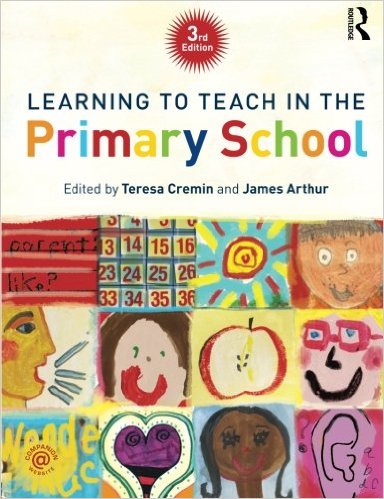 |
Learning to Teach in the Primary School: Teresa Cremin et alea (3rd Edition, 2014). Flexible, effective and creative primary school teachers require subject knowledge, an understanding of their pupils and how they learn, a range of strategies for managing behaviour and organising environments for learning, and the ability to respond to dynamic classroom situations. |
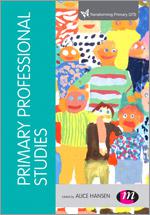 |
Primary Professional Studies: Alice Hansen (3rd Edition, 2015). Primary teacher training is challenging. Trainees must be prepared to consider teaching in innovative ways, while remaining focussed on the unchanging requirements of children’s learning. The third edition of this popular core book supports trainee teachers working towards primary QTS taking account of the diverse aspects of primary professional studies. |
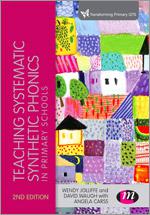 |
Teaching Systematic Synthetic Phonics in Primary Schools: Wendy Jolliffe et alea (2015) Systematic synthetic phonics is a key strategy in the teaching of reading. This text supports trainee teachers working towards primary QTS in how to use phonics effectively. It explores what works in phonics teaching, and why. It begins with the subject knowledge that underpins effective teaching and goes on to explore pedagogy from the early years to Key Stage 2. The book includes a review of different popular phonics programmes, set against the DfE (2011) criteria for high-quality phonics teaching. |
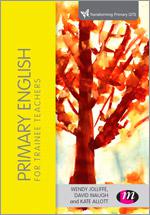 |
Primary English for Trainee Teachers: David Waugh et alea (2014). Covering all areas of the new National Curriculum for primary English and offering insight into effective teaching, it helps you connect what you need to teach, to how it can be taught. It opens up the opportunities in the new curriculum for creative and imaginative teaching and covers all areas of children's literacy from poetry and literature to SPAG. |
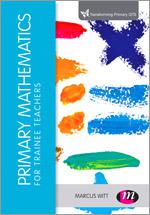 |
Primary Mathematics for Trainee Teachers: Marcus Witt (2014). Covering all of the areas of the new Curriculum for primary mathematics and offering insight into effective teaching, this book helps students connect what they need to teach with how it can be taught. Exploring opportunities in the new curriculum for creative and imaginative teaching, it shows readers how to capitalize on opportunities to develop children's reasoning and problem solving skills. |
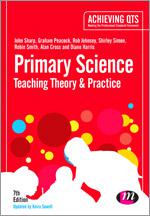 |
Primary Science: Teaching Theory and Practice: John Sharp et alea (7th Edition, 2015). The essential teaching theory and practice text for primary science. Covering the skills of planning, monitoring, assessment and class management, it relates these specifically to primary science. |
| Classroom Tips and Techniques |
 |
Classroom Starters and Plenaries: Kate Brown (2009). A good plenary allows students to focus on the key objectives of the lesson, and reflect on the progress they have made. These five minute slots at the beginning and end of lessons are an opportunity to be extremely creative and draw on a range of different ideas and sources. However, keeping them fresh engaging and challenging can be difficult, lesson after lesson. This book will provide teachers with a wide range of suggestions: from individual to whole class activities, from the energetic to the sedate, and from technical ideas that involve some planning to those which can be used straight out of the book. |
 |
500 Tips for Teachers: Sally Brown et al (1998). This updated text takes account of the changes that have occurred through technological advances, and has sections to cover ICT in the classroom. It is suitable for both new and experienced teachers in primary, further and higher education. |
 |
The
100 ideas series:
Maths - English - RE - Geog - MFL - Science - Planning - Trainees |
 |
The
100 ideas series - See
the list on Amazon |





























